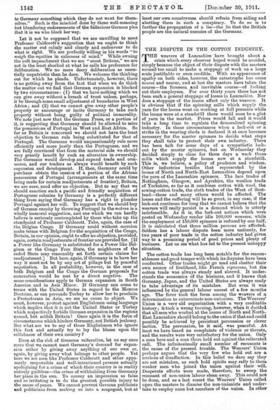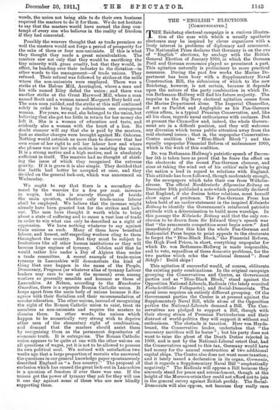THE DISPUTE IN THE COTTON INDUSTRY. T HE weavers of Lancashire
have brought about a crisis which every observer hoped would be avoided, simply because the object of their dispute with the masters seemed too small to make a stoppage of work on a large scale justifiable or even credible. With an appearance of apathy on both sides, however, the catastrophe has come nearer and nearer, and at last the masters have taken the course—the foreseen and inevitable course of locking out their employees. For over thirty years there has not been such a general stoppage of looms in Lancashire. Nor does a stoppage of the looms affect only the weavers. It is obvious that if the spinning mills which supply the yarn for the looms went on working at full pressure while the looms were at a standstill there would soon be a glut of yarn in the market. Prices would fall and it would take a long time to regulate the demoralized spinning industry. In these circumstances when a lock-out or a, strike in the weaving sheds is declared it at once becomes necessary for the master spinners to decide what steps they shall take to protect their own industry. There has been talk for some days of a sympathetic lock- out by the master spinners, but on Wednesday they decided simply to close for three days a week those mills which supply the looms now at a standstill. This is, we believe, a policy of prudence and wisdom. Other industries besides that represented by the looms of North and North-East Lancashire depend upon the yarn of the Lancashire spinners. The lace trades of Nottingham, Glasgow, and Ayrshire, the woollen trade of Yorkshire, so far as it combines cotton with wool, the sewing-cotton trade, the cloth trades of the West of Scot- land—these and many others would be affected. The losses and the suffering will be so great, in any case, if the lock-out continues for long that we cannot believe that the weavers will really persist in a demand which is utterly indefensible. As it is, the lock-out notices which were posted on Wednesday render idle 160,000 weavers, while the employment of 150,000 spinners is reduced by one half. It is calculated that three million persons are affected. Seldom has a labour dispute been more untimely, for two years of poor trade in the cotton industry had given way to a promising period of good prices and plenty of business. Let us see what has led to the present unhappy situation.
The cotton trade has long been notable for the reason- ableness and good temper with which its disputes have been conducted. Other trades might go mad and shatter their own source of livelihood, like French Dignerons, but the cotton trade was always steady and shrewd. It under- stands the economics of the business, and it knows that Germany, Japan, and the United States are always ready to take advantage of its mistakes. But even it was influenced by the general labour unrest of a few months ago. The fever took the form among the weavers of a, determination to exterminate non-unionism. The Weavers' Union is a very old organization with a very creditable history; it took a wrong turning, however, when it decided that all men who worked at the looms of North and North- East Lancashire should belong to the union if that end could possibly be achieved by persistent persuasion or clever tactics. The persuasion, be it said, was peaceful. At least we have heard no complaints of violence or threats, and the results were very satisfactory for the union. Only a man here and a man there held out against the reiterated call. The infinitesimally small number of recusants is the cause of the present trouble. The Weavers' Union perhaps argues that the very few who hold out are a nucleus of disaffection. In this belief we dare say they are not mistaken, as such bold spirits may rally to then; weaker men who joined the union against their will. Desperate efforts were made, therefore, to sweep the remnant of non-union labour clean away. This could not be done, and as a last resort the Weavers' Union called upon the masters to dismiss the non-unionists and under- take to employ none but members of the union. In other words, the union not being able to do their own business required the masters to do it for them. We do not hesitate to say that the masters would have earned the deep con- tempt of every one who believes in the reality of freedom if they had consented.
Possibly the weavers thought that as trade promises so well the masters would not forgo a period of prosperity for the sake of three or four non-unionists. If this is what they thought they made a great miscalculation. The masters saw not only that they would be sacrificing the tiny minority with gross cruelty, but that they would, in effect, be handing over their industry to the dictation—in other words to the management—of trade unions. They refused. Their refusal was followed by strikes at the mills where the non-unionists were employed. There was a strike at the Helene Mill, Accrington, where a man and his wife named Riley defied the union ; and there was another strike at the Great Harwood Mill, where a man named Scott and a woman named Margaret Bury held out. The man soon yielded, and the strike at this mill continued solely in order to bring to submission one courageous woman. For years, we read, she belonged to the union, but believing that she got too little in return for her money she left it. She is a woman of education and taste, and evidently also a woman with the heart of a lion. No doubt rumour will say that she is paid by the masters, just as similar charges were brought against Mr. Osborne. Nothing would astonish us more than to discover that her own sense of her right to sell her labour how and where she pleases was not her sole motive in resisting the union. It is a strong motive and a high motive, and is absolutely sufficient in itself. The masters had no thought of shirk- ing the issue of which they recognized the extreme gravity. If it is grave it is also simple. They decided that the battle had better be accepted at once, and they decided on the general lock-out, which was announced on Wednesday.
We ought to say that there is a secondary de- mand by the weavers for a five per cent. increase in wages, but this is scarcely thought of beside the main question, whether only trade-union labour shall be employed. We believe that the increase might already have been granted but for the strikes and lock- out. The men have thought it worth while to bring about a state of suffering and to cause a vast loss of trade in order to win what can only be described as a right of oppression. We have nothing whatever to say against trade unions as such. Many of them have benefited labour, and honest, self-respecting workers cling to them throughout the country. But they must be subject to limitations like all other human institutions or they will become huge engines of tyranny. Cobden said that he would rather live under a Dey of Algiers than under a trade committee. A. recent example of trade-union tyranny in Lancashire will demonstrate the kind of thing that may happen in the name of the People, Democracy, Progress (or whatever alias of tyranny Labour leaders may care to use at the moment) even among workers so generally sensible and humane as those of Lancashire. At Nelson, according to the Manchester Guardian, there is a separate Roman Catholic union. It keeps apart from the main body of unions because it dis- agrees with their Socialism and their recommendation of secular education. The other unions, instead of recognizing the right of the Roman Catholic union to exist, treat its members as non-unionists and require the masters to dismiss them. In other words, the unions which happen to be numerically very strong wish to deprive other men of the elementary right of combination, and demand that the masters should assist them by recognizing them as the permanent depositaries of economic truth. It is outrageous. The Roman Catholic union appears to be quite at one with the other unions on all questions of wages, yet it is not to be allowed to possess its own political soul. We noticed with satisfaction two weeks ago that a large proportion of recruits who answered the questions in our general knowledge paper spontaneously described England as " a free country." The proposal of exclusion which has caused the great lock-out in Lancashire is a question of freedom if ever there was one. If the unions get the power of tyranny they ask for they will use it one day against some of those who are now blindly supporting them.







































 Previous page
Previous page